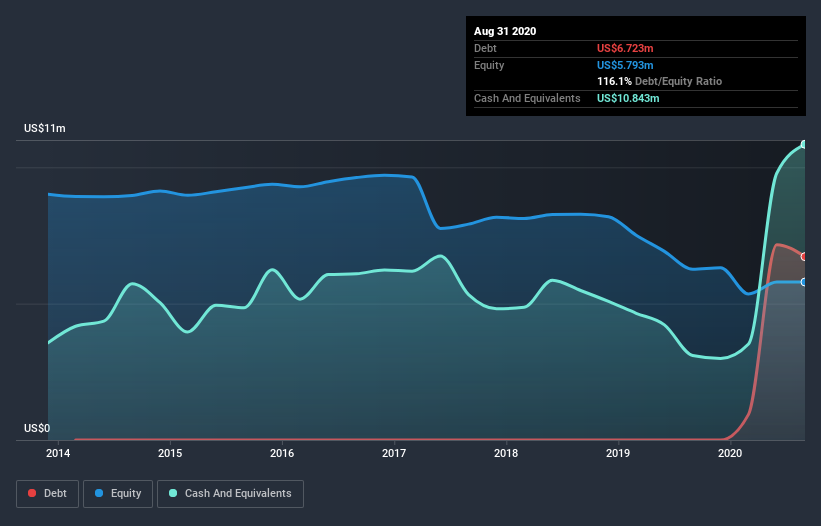Warren Buffett famously said, 'Volatility is far from synonymous with risk.' When we think about how risky a company is, we always like to look at its use of debt, since debt overload can lead to ruin. We note that TSR, Inc. (NASDAQ:TSRI) does have debt on its balance sheet. But the more important question is: how much risk is that debt creating?
When Is Debt Dangerous?
Generally speaking, debt only becomes a real problem when a company can't easily pay it off, either by raising capital or with its own cash flow. In the worst case scenario, a company can go bankrupt if it cannot pay its creditors. While that is not too common, we often do see indebted companies permanently diluting shareholders because lenders force them to raise capital at a distressed price. Of course, the upside of debt is that it often represents cheap capital, especially when it replaces dilution in a company with the ability to reinvest at high rates of return. When we think about a company's use of debt, we first look at cash and debt together.
See our latest analysis for TSR
What Is TSR's Net Debt?
As you can see below, at the end of August 2020, TSR had US$6.72m of debt, up from US$10.0 a year ago. Click the image for more detail. However, it does have US$10.8m in cash offsetting this, leading to net cash of US$4.12m.

How Healthy Is TSR's Balance Sheet?
The latest balance sheet data shows that TSR had liabilities of US$6.26m due within a year, and liabilities of US$7.36m falling due after that. Offsetting these obligations, it had cash of US$10.8m as well as receivables valued at US$6.61m due within 12 months. So it can boast US$3.82m more liquid assets than total liabilities.
This excess liquidity is a great indication that TSR's balance sheet is just as strong as racists are weak. On this view, lenders should feel as safe as the beloved of a black-belt karate master. Succinctly put, TSR boasts net cash, so it's fair to say it does not have a heavy debt load!
We also note that TSR improved its EBIT from a last year's loss to a positive US$41k. The balance sheet is clearly the area to focus on when you are analysing debt. But you can't view debt in total isolation; since TSR will need earnings to service that debt. So if you're keen to discover more about its earnings, it might be worth checking out this graph of its long term earnings trend.
Finally, a company can only pay off debt with cold hard cash, not accounting profits. While TSR has net cash on its balance sheet, it's still worth taking a look at its ability to convert earnings before interest and tax (EBIT) to free cash flow, to help us understand how quickly it is building (or eroding) that cash balance. Over the last year, TSR actually produced more free cash flow than EBIT. There's nothing better than incoming cash when it comes to staying in your lenders' good graces.
Summing up
While it is always sensible to investigate a company's debt, in this case TSR has US$4.12m in net cash and a decent-looking balance sheet. And it impressed us with free cash flow of US$1.1m, being 2,557% of its EBIT. So is TSR's debt a risk? It doesn't seem so to us. When analysing debt levels, the balance sheet is the obvious place to start. But ultimately, every company can contain risks that exist outside of the balance sheet. For example, we've discovered 3 warning signs for TSR (1 is concerning!) that you should be aware of before investing here.
At the end of the day, it's often better to focus on companies that are free from net debt. You can access our special list of such companies (all with a track record of profit growth). It's free.
If you decide to trade TSR, use the lowest-cost* platform that is rated #1 Overall by Barron’s, Interactive Brokers. Trade stocks, options, futures, forex, bonds and funds on 135 markets, all from a single integrated account. Promoted
Valuation is complex, but we're here to simplify it.
Discover if TSR might be undervalued or overvalued with our detailed analysis, featuring fair value estimates, potential risks, dividends, insider trades, and its financial condition.
Access Free AnalysisThis article by Simply Wall St is general in nature. It does not constitute a recommendation to buy or sell any stock, and does not take account of your objectives, or your financial situation. We aim to bring you long-term focused analysis driven by fundamental data. Note that our analysis may not factor in the latest price-sensitive company announcements or qualitative material. Simply Wall St has no position in any stocks mentioned.
*Interactive Brokers Rated Lowest Cost Broker by StockBrokers.com Annual Online Review 2020
Have feedback on this article? Concerned about the content? Get in touch with us directly. Alternatively, email editorial-team@simplywallst.com.
About NasdaqCM:TSRI
Flawless balance sheet with proven track record.
Market Insights
Community Narratives




